- Home
- Jane Smiley
Pie in the Sky Page 16
Pie in the Sky Read online
Page 16
On the way back to the barn, Mr. Rosebury kept talking to Daddy. “Now, it’s fall and the show season is over, and we can do some things for fun that we wouldn’t have time to do in the spring, like play around on the outside course. These jumps are for three-day eventing. That’s the colonel’s first love, and it’s an Olympic sport, but between you and me, there isn’t a dime to be made in that sport. It’s a sport for the horseman, really; old cavalry types love it. They can show off what they know to a knowledgeable audience, but I’ve set my sights on bigger game, if you know what I mean.”
Daddy kept nodding. Either Mr. Rosebury was overwhelming him, or Daddy was making a plan, but either way, you would have thought they were best friends now.
This is not to say that Mr. Rosebury didn’t pay attention to Sophia. He patted her on the head, and two or three times he peeked into her bag and made a little sign to her to keep eating. She and Jane hardly said a word to each other. When we were finished riding and were walking to the parking lot, Daddy and Mr. Rosebury were ahead of us, talking, and I walked next to Sophia. I said, “I thought the cross-country course was kind of fun, and not as scary to ride as to look at.”
“I’m never scared.”
“Why not?”
“I don’t know. Just never was.”
Now was the time to ask why she wasn’t riding. We walked toward the cars, but then Dad and Mr. Rosebury stopped, and Mr. Rosebury started tapping Dad on the chest with his forefinger, while Dad nodded. I didn’t want to hear what they were saying, so I stopped, too. This was when I said, “So why not ride?”
Sophia just shrugged. But then she said, “The more they want me to, the less I want to.” She cocked her head at her father, and I realized he had the same effect on me. It was like every word was a little prod of some sort, nudging you toward whatever he thought you should do. At least Dad and Mom were straightforward: “You will do this, and I’m not going to discuss it.” You could do it or not, but if you didn’t do it, you knew what the consequences would be, and if you did do it, well, whatever it was was over and done with. But for Mr. Rosebury, nothing was ever over, because he always had bigger plans. I thought maybe I should give up on Sophia.
Dad was in a good mood as we drove home. He hummed a couple of tunes that he liked, “Red River Valley” and “Banks of the Ohio.” We knew these songs, and I always thought it was funny that he sang them when he was happy, because they were sad songs. He didn’t say much to me about Pie in the Sky, other than “That horse ever turned out?”
“I don’t think so.”
“He might like that. He seems full of beans.”
“I guess they think he’s too valuable for that. I mean, he gets ridden four days a week, and maybe Rodney lunges him the other three.”
“Never could see that way of thinking, myself.” He shook his head. “Horse has to have time to be a horse.”
I went out and tacked up Blue and took him through the mare pasture down to the crick. Oh My and Nobby walked along with us and Rusty went ahead—at one point, I could hear her bark three times, and then I heard some rustling. If there was rustling, then she was chasing a deer, which she did just for exercise. Blue ambled along, happy to be out, and for sure happy to have some company going along with us. It was always true that when Oh My was relaxed, then the other horses were relaxed also because she was the boss mare of the little band. When we got down to the crick, Oh My splashed around in the six inches of water that was still running; Nobby even got down and rolled, since the bottom of the crick right there was sandy and cool. Blue seemed to enjoy their company. He dipped his nose in the water and splashed once or twice before taking a small drink, then he pawed a couple of times. I could tell that he felt very comfortable. I sat deep in the saddle and stroked him over the top of his haunches. Oh My was like Leslie, wasn’t she? She told everyone what to do, but in a relaxed way. Blue had friends. Probably Pie in the Sky did not have friends—Sophia wasn’t his friend, and I wasn’t his friend, and the way he lived at the stables meant that he didn’t have a chance to make horse friends.
* * *
Sophia now sat with us at lunch every day, and Alana sat across the room, by the window, with Linda A., whom we had gone to school with, and some new friends of hers that she had met working on the school newspaper and the yearbook. Leslie had made a rule that if Sophia saw something in our lunches that looked good to her, she could eat it, and that person would get a bonus point for letting her have it.
So every day we would take our lunches out of the sacks and Sophia would look at them, and sometimes she picked something. When she did, we all laughed. But Leslie gave her a rule, too—she had to eat it. It was actually kind of fun, and I found that when I was deciding what to put in my lunch in the morning, I looked for things that Sophia might possibly choose. The one I came up with was dried apricots. Stella came up with Fig Newtons. Leslie herself came up with carrot sticks dipped in cream cheese. Lucia brought popcorn from the night before. Sophia’s eyes actually got big when she saw that, and she ate it right up. We had no idea what we would do with the bonus points, but we figured that Leslie would come up with something.
It was Leslie who told me that there was a bus that went from the high school past the Marble Ranch, stopping on the way to pick up kids at the junior high. If I wanted to go to the Marble Ranch, that was the one I would take. I decided not to wait any longer and, on Tuesday, called Mom from the office. She said it was okay.
When the kids got on at the junior high school, Daphne got on almost last and sat down in the front. But the bus driver took off pretty fast and we all had to stay seated, so I couldn’t let her know I was there. It was interesting to watch her, though. She sat next to the window, smiling and looking out at the passing scenery. She talked a little bit to the girl next to her, but it didn’t seem like they were good friends. Then, after we had been going for about five minutes, a paper wad hit the window above her head, and she turned around. Just as the bus driver looked in the mirror and shouted, “Hey, back there! George Kennedy, I see you!” another paper wad flew in Daphne’s direction, and her hand went up and caught it, just like that. She gave it to the girl next to her, who leaned forward and gave it to the bus driver, who called out, “I’m taking this to the police, and they are going to fingerprint this!”
I don’t think anyone believed him, but the kids did quiet down. Daphne went back to looking out the window.
When we got to the stop, she got off without realizing that I was behind her, but when I stepped down from the bus, she exclaimed, “Oh, Abby! Hi! Were you really on the bus?”
“I was in the back.”
We started up the road.
I said, “That was neat, the way you caught that paper wad.”
She grinned. “That bus is crazy. Some of those boys were talking about putting a bag over the bus driver’s head one day.”
“They never did it, did they?”
“I would have tripped them if I saw them coming.”
“I bet you would have.”
The arena was empty, so we walked all the way up the hill to the barn, and I followed Daphne into the office, then into a small courtyard. It was a windy spot, and the oaks were huge—they loomed over the barns and the leaves rattled, but the view was wide and imposing, with the Marble Ranch valley just beneath us, then a deeper valley, and steep, dark green mountains beyond that. Daphne took her books into one of the cabins, and as I was looking around, Danny emerged from one of the others (there were three), and of course he was surprised to see me. It was almost four thirty by the stable clock. I said, “Is that your room?”
He nodded.
“Can I see it?”
But he ignored me, which I expected him to do. Even when he was living at home and he was twelve and I was eight, he had a sign on his door that said, “Do Not Entire!” When he didn’t answer, I poked him in the ribs, and he laughed, but he still didn’t take me to see it. I said, “I want to watch the Carmichaels s
ome more.”
“I guess Daphne is going to ride, and I suppose you can watch. But how are you going to get home?”
I knew Danny would take me. But I didn’t say anything. Daphne came out in her riding clothes, with two apples in her hands. She said, “You want one of these? They’re Sierra Beauties. Pop knows a guy who sends them to us.”
I took the apple, and tasted it. It was really good. Danny said, “Hey! Aren’t you going to even give me a bite?”
I gave him a bite. Then she said, “I guess they’re down there? The bus was a little slow today.”
Danny said, “Well, someone brought a horse from up in Watsonville. I shod him, too. But only in front.”
“Oh,” said Daphne. “That’s Curly. He’s fun. Pop coaches him once a month. Mr. Pinckney brings him to us, wherever we are.”
I said, “How much does your dad charge?”
“Well,” said Daphne, “he charges a half peck of onions, some pork chops, a couple of pork roasts, some garlic, and some lettuce. Mr. Pinckney has a farm up there. He brings stuff.”
I said, “Would he take money?”
Danny and Daphne both laughed.
As we came down, we could see someone letting Curly into the arena. He trotted around a little bit, then whinnied. Curly was little and almost black, only about the size of Morning Glory, but muscular and strong-looking. Ralph was standing with the owner, talking. Daphne called out, “Hey, Pop!”
He gave her a big smile, and the owner shouted, “Hey, Daphne, how are ya, darlin’?”
Daphne began to run, and Danny and I sped up.
We followed the three of them and the horse to the training paddock. I guess Daphne had been riding and training Curly for a while—he was a mature horse and fit. He walked along on a loose rein with his tail swinging back and forth, but he had his eye out. He looked alert and self-confident. When they got to the pen, I saw that the jumps were pretty high, and there were a lot of poles stacked in the center of the paddock. Daphne spent about ten minutes warming the little horse up, mostly on a loose rein, but she did ask him, bit by bit, to lift his head and lengthen his stride. When they were finally going, he looked like a picture in a book, stepping lively, his neck arched and his ears pricked. Just about then, Andy showed up.
When Daphne started the jumping part, she picked up a real gallop, not a canter. The difference was not in the horse’s level of excitement, or even the quickness of his strides, but in his stride length. He went at a good pace around the arena, changing directions, changing leads, slowing down, speeding up. He handled his body as well as I had ever seen a horse do, and Daphne stuck right with him. She galloped down over the fences that Ralph and the owner had built for her, and she did it on her own—Ralph didn’t call out and tell her what to jump. The effect of this was to make the whole thing seem more fun. She was doing what she felt like (and the horse felt like) without being ordered about.
She must have taken fourteen or sixteen jumps, first at about 3′3″ and then about 3′6″. Ralph and Andy just went around, staying out of her way, and raised the jumps. Then she came to the trot and let the horse stretch his head and neck down and move out. The horse trotting was like a baseball player or some other kind of athlete stretching himself a little after making an effort. Then they walked. While they were taking a break, Ralph and Andy and the owner started moving the poles. Danny and I went in to help them when we saw what they were doing.
They were building a long chute that ran around half of the pen, and inside the chute, at intervals, were jumps, just poles, but high—3′9″ and 4′. It took us about ten minutes to complete the whole thing, and Daphne spent some of that time trotting and turning; she was always moving. When we were finished with the chute, we backed away, and Ralph went over to Curly, who was standing near the front of the chute, and removed his bridle. Curly picked up his trot and then his gallop and galloped down through the chute, jumping the jumps, and Daphne spread her arms out like wings, the way I often had Barbie Goldman and the girls do at the walk. And she jumped the jumps in perfect rhythm. Curly did not have to be asked twice—he kept going around the pen after he was out of the chute, and went right down through it and over the jumps again. I was impressed, and so was Danny—he was staring with his mouth a little open and his eyebrows raised. I whispered, “Did you ever see this before?” and he shook his head. I guess Curly was the first trained jumper he had seen the Carmichaels work with; other than him, it was all green horses.
They raised the jumps yet again, and Daphne and the horse did it once more. This time, Daphne had one hand on her chest and one over her head. She was like a circus rider.
It was pretty clear that Curly had his own style. He did not arc over the fence quite as nicely as Barry Boy—he popped over it and kicked his back legs. If he took the wrong lead, Daphne did not force him to change back, but waited until he realized that things were easier if he was on the proper lead. In fact, it looked like Curly was so sure of what he was doing that Daphne was more or less along for the ride. Andy came over to us, and I said, “How high can that horse jump?”
“Well, he’s done a five-foot course, but only a couple of times.”
“Who rode him?”
“I did.”
Danny said, “Where did Mr. Pinckney get him?”
“You want to know?”
We nodded.
“Got him from a pony ride place. These little kids would get on him, and then they would get buckled in, and the horses would trot around a kind of grid. Mr. Pinckney didn’t really know why he bought him—he’s got a ranch but no horses, only trees and vegetables and fruits. But he had a feeling, and so he brought him home. One day, when Curly was feeling frisky, he jumped out of his pen and trotted down the road to make friends, and the place he went, those people knew us, so they suggested Mr. Pinckney give dad a call.”
“Should have named him Jack in the Box,” said Danny.
“He does show a couple of times every year, but he’s mostly a pet. Mr. Pinckney built him a stall off the back of their house, and he’s allowed to put his head in the window and have treats.”
I said, “I wish we could do that. Dad doesn’t even allow the dog in the house.”
Andy walked away, and Daphne took Curly out for a walk around the big arena. We started taking down the chute, and I said to Danny, “I want Blue to do this.”
“That would be fun.”
“No, I mean it. I want to bring Blue over and have some lessons. I’ll pay. That guy Peter Finneran charged sixty dollars. I’ll pay that.”
“Do you have that?”
“In—”
“Will Dad let you spend that?”
I shrugged. It was one of those let-him-try-and-stop-me shrugs.
Then Danny said, “Well, but they might be leaving. I think I heard them say—”
I walked right over to Ralph Carmichael, and I said, “Mr. Carmichael, I want some lessons with you more than anything in the world. I will pay you sixty dollars, and do it anytime you like. I have a wonderful sweet horse—he’s a Thoroughbred and he has a great canter, and this is exactly what he needs.”
Ralph looked a little startled, and actually stroked and curled the right side of his mustache. Then he said, “Well, when do you have in mind?”
“Danny says you might be leaving?”
“We’ve got some plans to get down to Los Angeles in a bit.” He looked at me for a long moment, but it wasn’t the way most grown-ups look at you, as if you had better do something or else. He had brown eyes under the white eyebrows. After a moment, he said, “Oh, sorry. I was just thinking.” He shook his head. Then he said what grown-ups always say: “We’ll see.”
I said, “I have sixty dollars. Danny can bring Blue over here and take him home. You can decide how many lessons sixty dollars is worth.”
Mr. Carmichael smiled and said again, “We’ll see.”
Danny did take me home. He grumbled about it, but it turned out he wanted to talk to D
addy about taking Happy to a roundup, and then there was fried chicken for supper, and so why not?
The thing with grown-ups is that you have to get them to think that something you want is their idea. And anyway, I was still excited about what we had seen, so as soon as everyone was sitting at the table, I said, “A guy brought his horse down from Watsonville for Ralph Carmichael to train, and he was about the size of Morning Glory and he jumped four feet.” I glanced at Danny, then said, “He’s just a pet, but Andy says he’s jumped him over five-foot courses a couple of times.”
I allowed this to sink in, and then Danny said, “Ralph’s idea is that horses are a lot better jumpers than we think they are. We just don’t train them to enjoy it.”
Mom said, “Five feet! I don’t think—”
I said, “Daphne did the highest jumps without even a bridle.”
Mom said, “Did it break?”
“No.” Danny lifted his eyebrows. “Ralph removed it. I’ve seen them do that once before.”
Dad said, “Horses can do lots of things without bridles. My mare used to cut cattle without a bridle.” I had forgotten this.
Danny said, “Ralph likes them to be as free as they can be. When he—” He glanced at me. “Well, you’ll see.”
“See what?” said Mom.
“You’ll see how he does it when Abby takes Blue over there and has a lesson or two.”
“Blue is certainly not ready for—”
I said, “No, but most of the horses they train over there are beginners. Three- and four-year-olds off the track. They do little things. But they like it.”

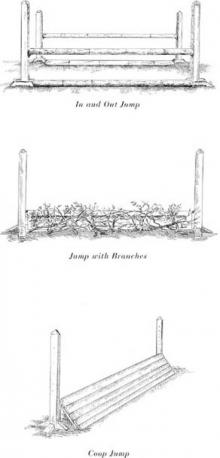 The Georges and the Jewels
The Georges and the Jewels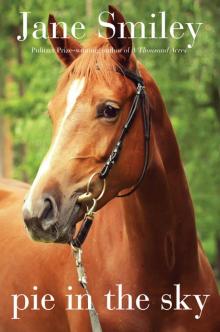 Pie in the Sky: Book Four of the Horses of Oak Valley Ranch
Pie in the Sky: Book Four of the Horses of Oak Valley Ranch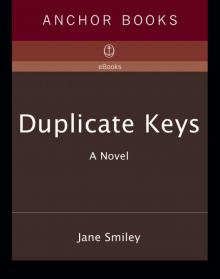 Duplicate Keys
Duplicate Keys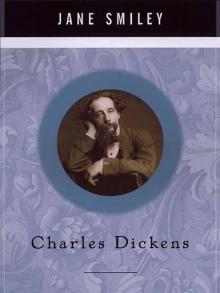 Charles Dickens
Charles Dickens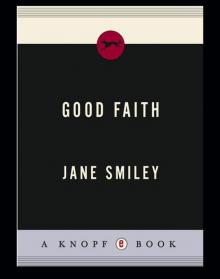 Good Faith
Good Faith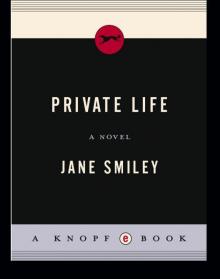 Private Life
Private Life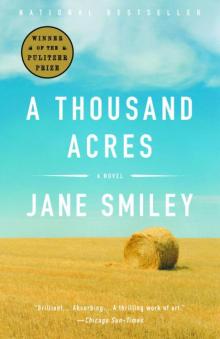 A Thousand Acres: A Novel
A Thousand Acres: A Novel The Greenlanders
The Greenlanders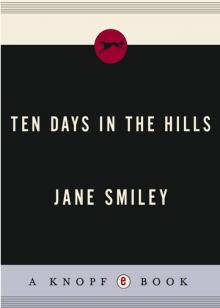 Ten Days in the Hills
Ten Days in the Hills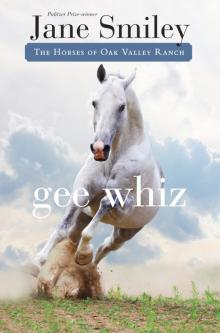 Gee Whiz: Book Five of the Horses of Oak Valley Ranch
Gee Whiz: Book Five of the Horses of Oak Valley Ranch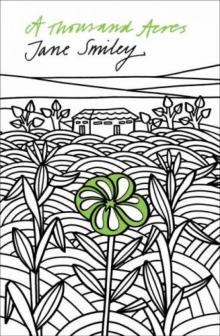 A Thousand Acres
A Thousand Acres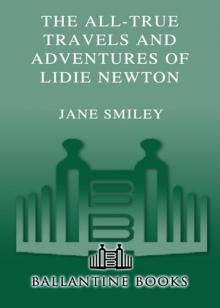 The All-True Travels and Adventures of Lidie Newton
The All-True Travels and Adventures of Lidie Newton Ordinary Love and Good Will
Ordinary Love and Good Will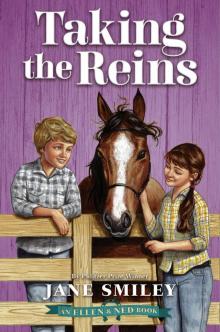 Taking the Reins (An Ellen & Ned Book)
Taking the Reins (An Ellen & Ned Book) The Man Who Invented the Computer
The Man Who Invented the Computer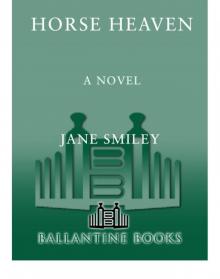 Horse Heaven
Horse Heaven The Age of Grief
The Age of Grief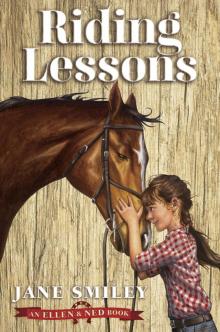 Riding Lessons
Riding Lessons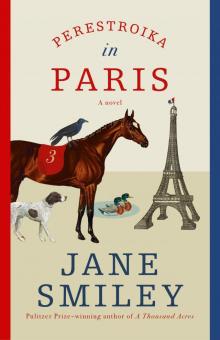 Perestroika in Paris
Perestroika in Paris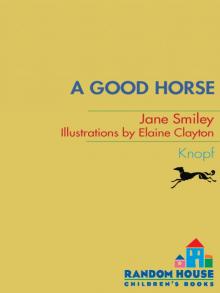 A Good Horse: Book Two of the Horses of Oak Valley Ranch
A Good Horse: Book Two of the Horses of Oak Valley Ranch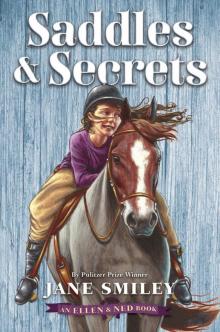 Saddles & Secrets (An Ellen & Ned Book)
Saddles & Secrets (An Ellen & Ned Book)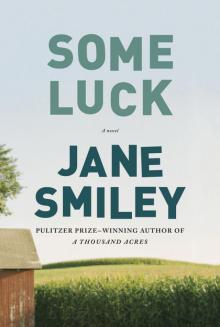 Some Luck: A Novel
Some Luck: A Novel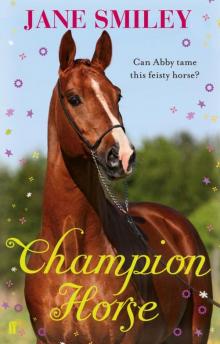 Champion Horse
Champion Horse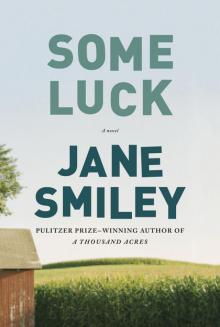 Some Luck
Some Luck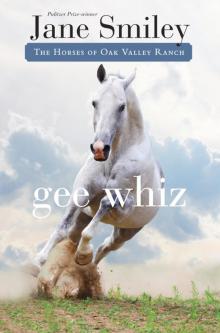 Gee Whiz
Gee Whiz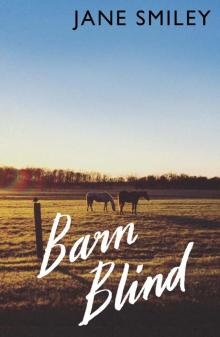 Barn Blind
Barn Blind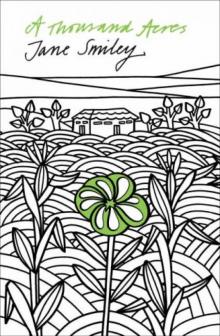 A Thousand Acres (1992 Pulitzer Prize)
A Thousand Acres (1992 Pulitzer Prize)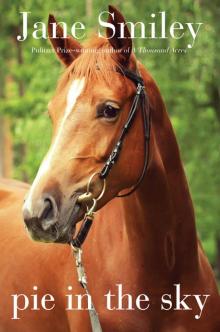 Pie in the Sky
Pie in the Sky True Blue
True Blue A Thousand Acres_A Novel
A Thousand Acres_A Novel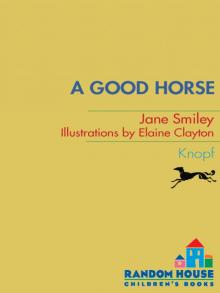 A Good Horse
A Good Horse